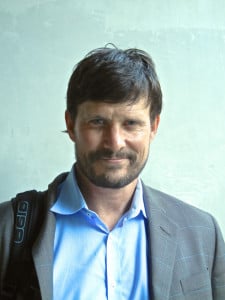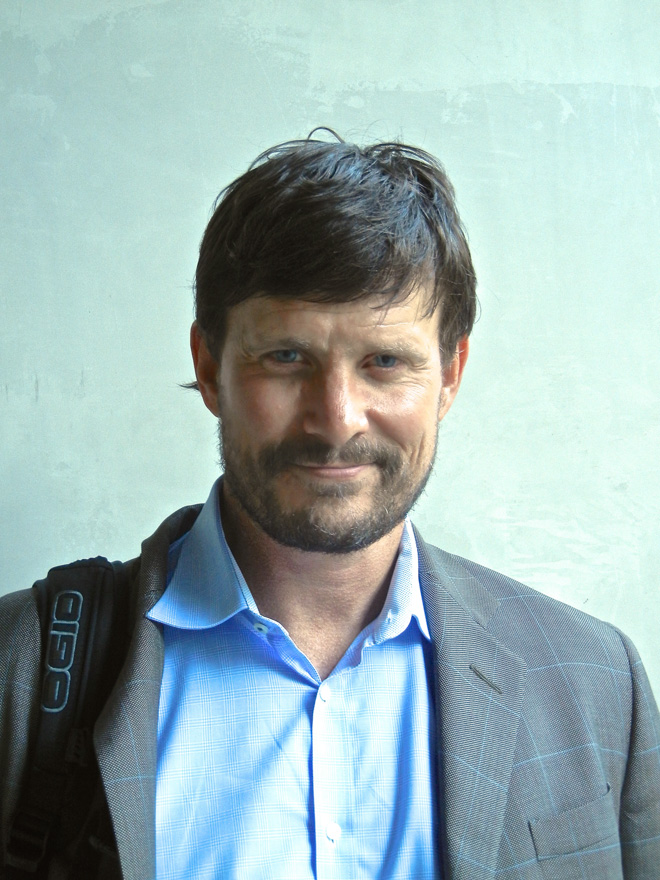
Three months after his evacuation from Sierra Leone, Dr. Ian Crozier found Ebola in his eye. This was after he was declared cured of the illness he had fought first as a volunteer doctor with the World Health Organization (WHO), and later as patient. His case is part of a growing body of evidence that Ebola has effects well after some patients are deemed virus-free.
Dr. Crozier was one of many medical workers – both volunteers from abroad and unsung locals – who fell victim to the virus while battling it in West Africa during the 18-month crisis. He was on a ventilator, underwent dialysis, and navigated a host of brain and muscle issues. Despite his recovery, he says his mind is not quite agile as it was before.
Now at home, he is working to educate people about the illness, as well as the global health and media response. Before his seminar here at Stanford on his experiences as an Ebola “dual citizen” – at once doctor and patient – he spoke to the Daily about his personal memories of Ebola, and what we can do better.
The Stanford Daily (TSD): How did you come to work for the WHO in Sierra Leone?
Ian Crozier (IC): Well, I’ve been working in Africa for the last 5-6 years at place called the Infectious Diseases Institute. My training is in infectious diseases, so I trained clinicians and trained nurses to deal with HIV-infected patients. Those of us on the ground heard about the [Ebola] tragedy and I, like many others, thought my skills might be needed. I actually applied both to Médecins Sans Frontières and the WHO.
A friend who happened to be on the ground at that time called me on a Thursday afternoon and began a conversation that put me in Sierra Leone. He was on the WHO’s Global Outbreak Alert and Response Network that was providing technical assistance to a group of national healthcare workers at that time who were overwhelmed by the unexpected volume of cases. At the end of July, Dr. Sheik Humarr Khan had just died in Kenema — he was a virologist who had been studying the outbreak — and he took care of the first patients. It really became ground zero for the health outbreak. All that happened as I was coming in early August 2014.
TSD: How did you prepare for the situation? What surprised you?
IC: All of us were in one sense technically prepared and ready, aware of what is required to take care of patients in technical training. But no matter how we were technically trained, none of us were prepared for what I found in wards. I’ve said many times that I’ve seen infectious disease play themselves out in multiple different settings, but I’ve never seen anything as devastating as this pathogen. This virus not only kills people at very high rates, it robs patients of their dignity.
In some senses, it’s not rocket science. We know how to do this — people have written eloquently about some aspects of care. It’s simple, just not easy.
TSD: Is there anyone you particularly remember from your time in Sierra Leone?
IC: I’m so glad you asked that. There were many — I could tell stories for a few weeks. One of the problems in our society, our media and our academic medical culture is that we seem to have forgotten the fact that over 800 healthcare workers over the last 18 months went into care environments and some of them absorbed the risk with their lives. I’ve found it a particular privilege to be on the ground with some of the national healthcare workers who were understandably anxious about going into the space. They had seen many of patients die, some of their friend and family die – and yet they went in regardless.
One was our head nurse, Nancy Yoko. She was a really kind and tough woman, I speak about her often. For a time I was the lead clinician at the hospital, so we were increasingly dependent on each other, trying to keep together a group of healthcare workers who were nervous about going into the space.
She was figuring out ways to remind people of ways to keep themselves safe, constantly asking people about own symptoms, reminding people of need to put safety at top of food chain. Some of that was wordless and came with being present as people wailed and mourned for patients. Some of it was logistical, ensuring that there were enough supplies, talking to all the different groups of people – many, many layers of leadership. She was a remarkable woman who did a remarkable job, though she was tired.
One of the most devastating notes of my story is her coming to me with fever and fatigue in early September and later admitting her to suspect unit, transferring her to the confirmed unit. Eventually, I mourned for her with my team and the whole community as she died.
I often say I was in Kenema for just a short time, and those national healthcare workers did a great deal with very little fanfare, very resolutely. They’re not under the lights being interviewed. Some of them are doing it even now. And I find it untenable that we have forgotten that already.
TSD: What did you think about the media coverage of Ebola abroad?
IC: I saw some of media coverage as I was waking up, trying to put dots together in my own head with strange doctors around me. I was disheartened to see how much of the coverage was not about the tragedy in West Africa. It was about our needs. It focused on US shores. It’s understandable of course to call attention to the cases here. When Dr. Brantly was med-evacuated, it was an important time. Some of that media coverage was actually key to putting it on everyone’s radar. But in some regards it became quite navel-gazing, in terms of how to make us safer, how to boost our security from Ebola.
TSD: Many of us in the United States and around the world felt as though we were watching the disease from a distance. What do you think people without the medical training could try to contribute?
IC: Remembering would be appropriate. I mean, a much bigger theme to many of these questions have to do with much bigger inequities in global health. But I think there’s a general need to pay attention to what’s happening. That could be the beginning.
TSD: You spoke about the effect Ebola has on patients. Has it changed you? With the knowledge of the longer-term implications of Ebola, do you have any plans for the future?
IC: It’s certainly affected my life. Physically, I haven’t told you everything. It’s changed me – my brain is less agile than it used to be, and some other physical things. Certainly, it’s been a watershed moment in my life in many ways. It’s probably changed how I take care of patients in many aspects.
At least for a while I’ve been interested in advocating for care of survivors and caring for them well and pushing the envelope on the scientific questions involved in my case and those of others. At least for a time, my efforts will be directed to that.
And as for rest of my life — stay tuned.
This transcript has been lightly edited and condensed.
Contact Fangzhou Liu at fzliu96 ‘at‘ stanford.edu.
